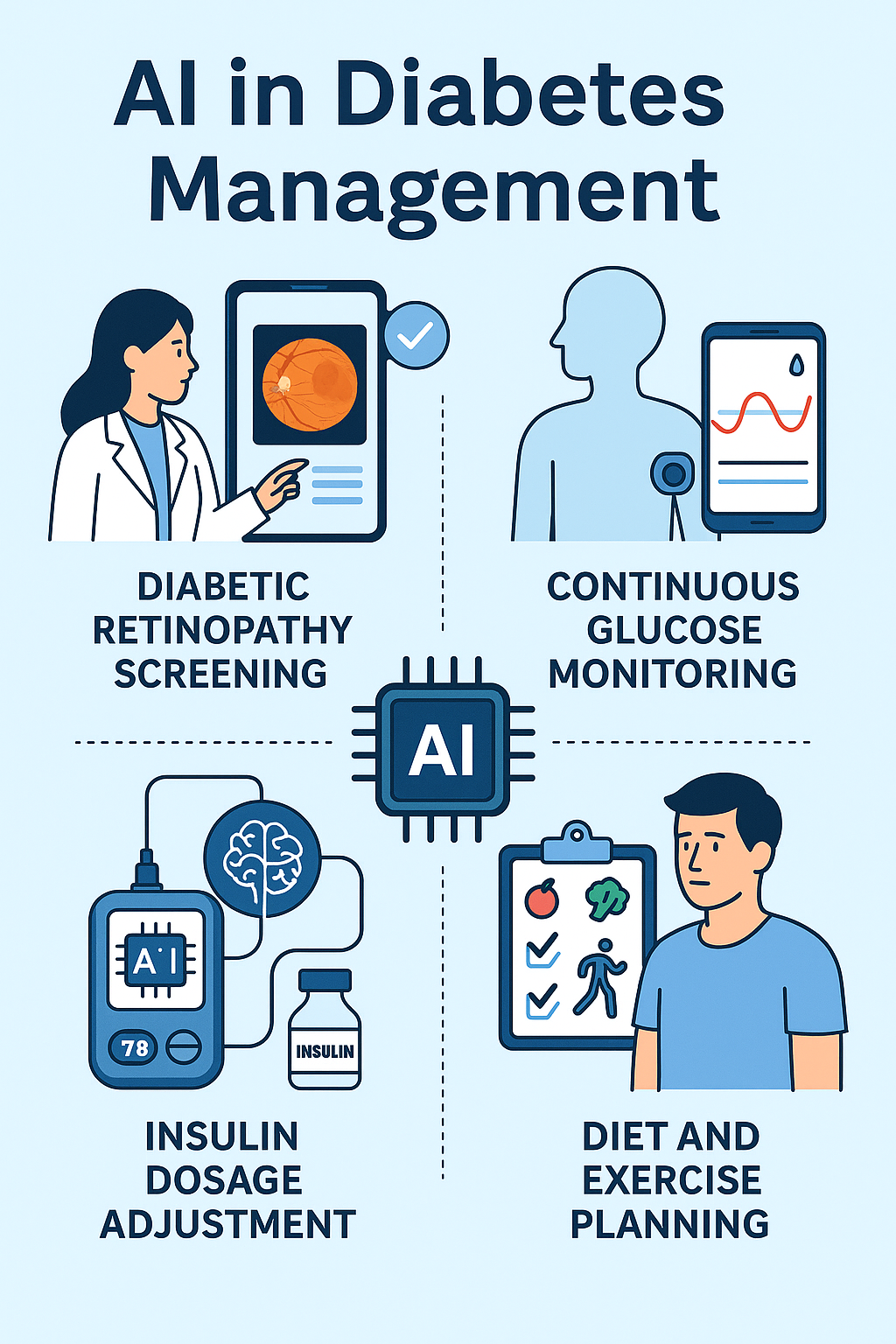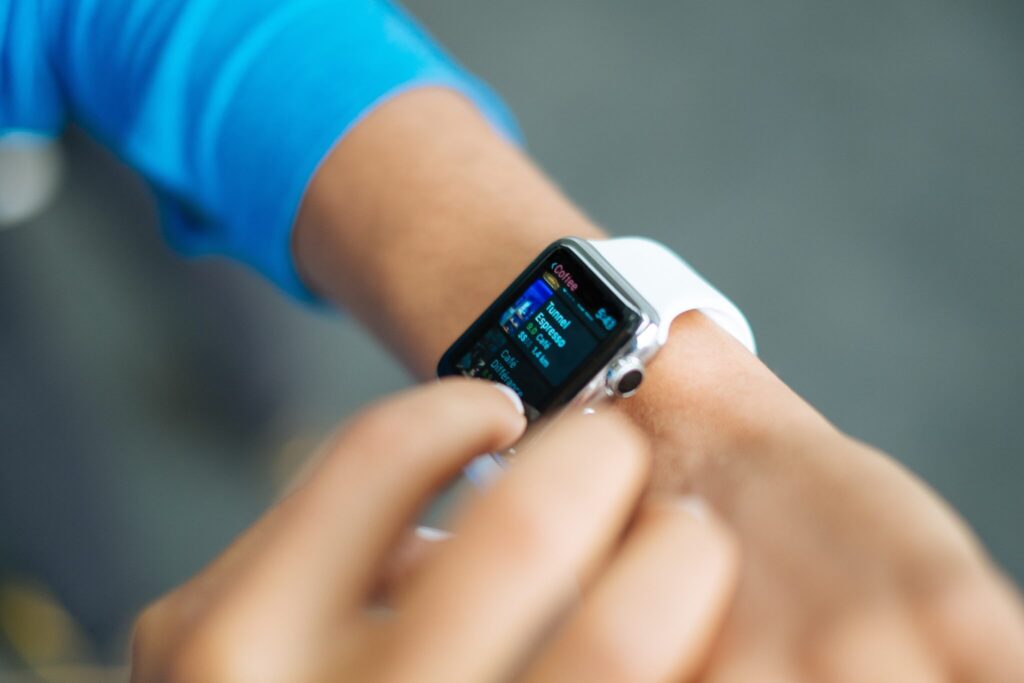
AI-driven Diabetes Management
- Jun 30, 2025
- 0 Comments
A continuing health problem or prolonged illness that usually lasts a year or more and may get more severe or harmful with time is referred to as a chronic disease [1]. It often results from unhealthy lifestyle patterns [2]. Several chronic diseases are prevalent worldwide, including cancer, heart disease, and diabetes, which pose significant threats and are among the leading causes of death and serious disability globally [3]. Among these, diabetes is one of the most common and damaging chronic diseases.
Diabetes is a long-standing condition that arises when blood glucose (also known as “blood sugar”) does not remain within the normal range. Blood glucose levels are regulated by the hormone insulin, which is produced by the pancreas. Inadequate insulin secretion or insulin resistance leads to elevated glucose levels in the bloodstream, resulting in diabetes. Hypoglycemia (low blood sugar) may occur as a consequence of diabetes treatment rather than being a direct manifestation of diabetes itself.
There are three primary types of diabetes:
- Type 1 diabetes (also called insulin-dependent diabetes mellitus (IDDM) or juvenile diabetes)
- Type 2 diabetes (also called non-insulin-dependent diabetes mellitus, T2D, or adult-onset diabetes)
- Gestational diabetes (GDM; also referred to as pregnancy-induced diabetes) [4].

According to a 2023 study published in The Lancet, approximately 101 million people in India—11.4% of the population—have diabetes [5]. Globally, diabetes caused around 6.7 million deaths in 2021 [6]. It was estimated that 537 million people worldwide were living with diabetes in 2021, and this number is projected to rise to 643 million by 2030 if effective preventive measures are not taken [6].
Traditional diagnostic methods for diabetes include the A1C (HbA1c) test, fasting blood sugar test, oral glucose tolerance test, random blood sugar test, and glucose screening tests [7].
Standard treatments include:
- For Type 1 diabetes: insulin injections or insulin pumps
- For Type 2 diabetes: lifestyle changes and oral medications such as metformin, and increasingly SGLT2 inhibitors [8]
Newer treatment guidelines by the ADA and EASD recommend GLP-1 receptor agonists and SGLT2 inhibitors not only for controlling blood sugar but also for reducing complications related to the heart and kidneys [9].
Role of Artificial Intelligence (AI) in Diabetes Management
Given the high prevalence and severity of diabetes, traditional diagnosis and treatment approaches can benefit from enhancement through advanced technologies. Artificial Intelligence (AI) is emerging as a powerful support system in this direction [10].
The FDA has approved several AI tools for diabetes care. For instance:
- Digital Diagnostics' autonomous AI system was approved in 2018 for diagnosing diabetic retinopathy from retinal screening images [11].
- Medtronic’s Guardian Connect System, approved in the same year, predicts hypoglycemic episodes an hour in advance using AI [12].
In another study, an AI-based decision support system (AI-DSS) significantly improved insulin dosage optimization and glycemic control in Type 1 diabetes patients, proving to be both effective and safe [13].
Patents Illustrating AI Use in Diabetes
- KR2573659B1 discloses a device that uses AI models to predict and monitor pre- and post-meal blood glucose levels and provide dietary recommendations accordingly.
- US12248826B2 describes a system with AI-based application programming interfaces (APIs) for a cloud-based healthcare platform that analyzes medical conditions, including diabetes, using knowledge graphs.
- CN119446407A details an AI-enabled exercise rehabilitation system that monitors and analyzes a patient’s activity in real-time and supports remote medical consultations.
Commercial AI Devices in Use
- MiniMed 780G with Guardian Sensor 3 (Medtronic): A Continuous Glucose Monitoring (CGM) and insulin pump system that interprets biometric data and administers insulin accordingly [14].
- LumineticsCore by Digital Diagnostics: An FDA-approved autonomous AI system for diabetic retinopathy diagnosis [15].
- Advisor Pro by DreaMed Diabetes: An AI-based tool that offers recommendations on remote insulin dosing [16].
Conclusion
AI is revolutionizing diabetes management by providing advanced diagnostic capabilities, optimized treatment recommendations, and personalized health monitoring. As demonstrated by the approved tools, research studies, and patents, the integration of AI into diabetes care is promising and likely to become increasingly central to future healthcare strategies.
List of Citations
[1] https://www.cancer.gov/publications/dictionaries/cancer-terms/def/chronic-disease
[2] https://www.sciencedirect.com/topics/social-sciences/chronic-disorder
[3] https://www.cdc.gov/chronic-disease/about/index.html#:~:text=Definition%E2%80%8E,inactivity%2C%20and%20excessive%20alcohol%20use
[4] https://www.niddk.nih.gov/health-information/diabetes/overview/what-is-diabetes#:~:text=Diabetes%20is%20a%20disease%20that,can%20appear%20at%20any%20age
[5] https://www.bbc.com/news/world-asia-india-65852551
[6] https://www.nature.com/articles/s41598-023-29978-y#:~:text=Diabetes%2C%20a%20non%2Dreversible%20chronic,attributed%20to%20diabetes%2C%20globally4.
[7] https://www.cdc.gov/diabetes/diabetes-testing/index.html
[8] https://www.mayoclinic.org/diseases-conditions/diabetes/diagnosis-treatment/drc-20371451#:~:text=Treatments%20for%20type%201%20and,transplant%20may%20be%20an%20option
[9] https://www.cdc.gov/diabetes/data-research/research/new-diabetes-medicines.html
[10] Wang, Serena CY, Grace Nickel, Kaushik P. Venkatesh, Marium M. Raza, and Joseph C. Kvedar. "AI-based diabetes care: risk prediction models and implementation concerns." NPJ digital medicine 7, no. 1 (2024): 36.
[11] Abramoff, Michael D., Noelle Whitestone, Jennifer L. Patnaik, Emily Rich, Munir Ahmed, Lutful Husain, Mohammad Yeadul Hassan et al. "Autonomous artificial intelligence increases real-world specialist clinic productivity in a cluster-randomized trial." NPJ digital medicine 6, no. 1 (2023): 184.
[12] Šoupal, Jan, Aneta Hásková, and Martin Prázný. "Response to Comment on Hásková et al. Real-time CGM is superior to flash glucose monitoring for glucose control in type 1 diabetes: the CORRIDA randomized controlled trial. Diabetes Care 2020; 43: 2744–2750." Diabetes Care 44, no. 4 (2021): e77-e78.
[13] Nimri, Revital, Tadej Battelino, Lori M. Laffel, Robert H. Slover, Desmond Schatz, Stuart A. Weinzimer, Klemen Dovc, Thomas Danne, and Moshe Phillip. "Insulin dose optimization using an automated artificial intelligence-based decision support system in youths with type 1 diabetes." Nature medicine 26, no. 9 (2020): 1380-1384.
[14] https://www.alcimed.com/en/insights/artificial-intelligence-diabetes-management/#:~:text=AI%20algorithm%20can%20interpret%20biometric,to%20implement%20personalized%20prevention%20strategies.
[15] https://www.digitaldiagnostics.com/products/eye-disease/lumineticscore/
[16] https://pmc.ncbi.nlm.nih.gov/articles/PMC11289240/

